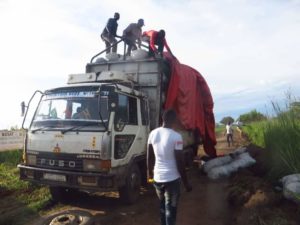Minds of the Movement
An ICNC blog on the people and power of civil resistance
by Phil WilmotJuly 24, 2019
Uganda’s forests are disappearing at disturbing rates. After tireless but unproductive advocacy efforts, a small group of young farmers in the remote district of Amuru may have found a hack to curb deforestation with direct action. This year they’ve already impounded 27 truckloads of charcoal.
Amuru District is renowned for its fight against land grabbing. In April 2015, female elders of Amuru disrobed to invoke an omen upon two state ministers attempting to redistrict their community. The redistricting was successfully thwarted. In August 2017, Madhvani Sugar Company backed out of its attempt to develop a 100,000-acre plantation in Amuru through forced evictions, citing a “hostile environment.” In October 2018, 234 Amuru residents waged a one-month occupation of a United Nations office, forcing armed personnel out of their community.
Yet despite these brave efforts to retain control of their ancestral lands, for years Amuru residents couldn’t seem to defend against charcoal dealers’ indirect control of their land. These businessmen would send trucks to Amuru to buy charcoal at about US$3 per sack, which they would sell in Kampala for about $20, or in Somalia at high profit margins. A ready market for charcoal incentivized Amuru residents to prioritize tree-burning over gardening.
A tactical shift from persuasion to direct action

When NLDL Amuru impounds charcoal, they often try to find the proprietors behind the operation and make citizen arrests. Source: Author.
On November 15, 2018, youth carried placards to Amuru District Headquarters, protesting deforestation. Theirs was a demonstration of the typical variety: a few angry activists expressing demands to their leaders. The Resident District Commissioner and District Chairperson made a promise to stop charcoal dealing in Amuru.
“This was done only to dupe us,” said Denis Komakech, one of the leaders of the National Land Defense League (NLDL)’s Amuru chapter. “Their monitoring of charcoal business in Amuru lasted only two days. At this point we decided not to call upon any authorities, but to arrest the charcoal dealers ourselves.”
Komekech and 24 other members of NLDL Amuru set up a shift schedule to monitor trucks passing through their land. These trucks mainly arrived by night. After loading up charcoal and starting off to Kampala, drivers would be intercepted by the youth, who would offload the charcoal and destroy it while other members took meticulous notes about each vehicle.
The team would then work to track the details of the businessmen behind the charcoal purchases. So far, 15 have been arrested, including two policemen. In one incident, the youth “arrested” a policeman himself, and when fellow officers showed up to rescue him from the youth, they were deterred by large numbers of residents who gathered around to support the team.
In turning from typical protests to direct action, the youth of Amuru have effectively achieved what their district leaders should have been doing all along. (Some such leaders, inspired by the youth’s success, later joined them in destroying impounded charcoal.) The youth did not need to fundraise for substantial resources or mobilize large numbers of residents. Their strategy cut right to the chase. By making citizen arrests of those pillaging their community lands—what turned out to be a highly visible and popular tactic— they’ve dissuaded charcoal dealers from doing business in Amuru.
This strategy is so cost-effective and scalable that almost any community facing deforestation could use it.
The potential to crush the charcoal industry and regenerate forests
Ten years ago, Uganda’s National Environment Management Authority warned that if deforestation were to continue according to trend, in 40 years there’d be no more forests. Deforestation did not slow down. In the past three years especially, it has accelerated alarmingly.
This acceleration can be attributed in part to the skyrocketing population of Uganda. A population must eat, and in Uganda, the only cooking device with an economy of scale is the charcoal stove. Gas, solar, and electric cooking are only available to wealthier families in particular areas.
Citizens impounding truckloads of charcoal is a tactic that, if used throughout Uganda wherever charcoal is being purchased in bulk at low cost, will drive the market price of charcoal up. This will create a demand for forms of cooking energy that are less harsh on the environment.
Thinking longer term
Tactics of protest and persuasion, including most forms of public demonstrations, are often difficult to sustain. Even when they work in ways that get civil servants moving, they may need to be repeated as the morale and stamina of organizers dwindle. Direct action presents an immediate opportunity to do the things that authorities and public workers should be doing, but are not. In this way, direct action can even have a “multiplier effect,” causing the gears of government bureaucracy to spin a little faster to keep pace with ordinary citizens’ actions.
Direct action has helped Amuru residents tremendously, but still isn’t totally sufficient. Even after arresting these predatory businessmen, police are letting them go free, especially when there is bribery and scanty legal follow up.
“Our next step is to urge the district to allocate funds for forest regeneration, and task the youth to monitor the project themselves,” Komakech says. “We believe other communities can do even better than we have done, and [together] we can restore our forests.”

Phil Wilmot
Phil Wilmot is a former ICNC Learning Initiatives Network Fellow, co-founder of Solidarity Uganda, and a member of the Global Social Movement Centre and Beautiful Trouble. Phil writes extensively on resistance movements and resides in East Africa. Write to Phil at phil@beautifultrouble.org.
Read More